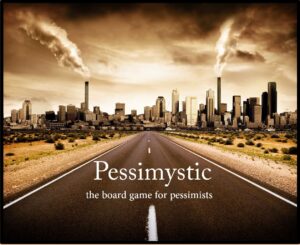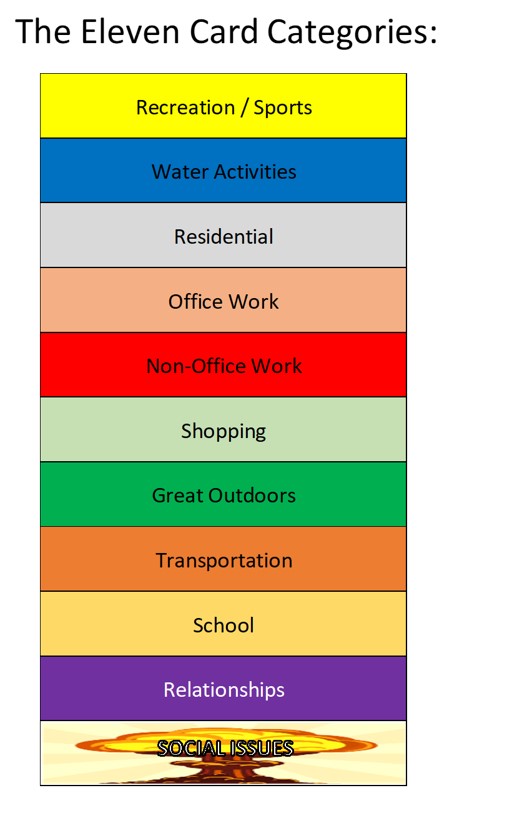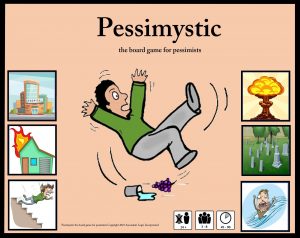Is The Merit Principle a Joke?
Let me start off by telling you that I have created a soon-to-be-released board game called “Pessimystic– the board game for pessimists”.  The objective of the game, and this series of blogs, is to kick out the long-standing fallacy that Optimists are rock stars and Pessimists are complaining cry-babies.
The objective of the game, and this series of blogs, is to kick out the long-standing fallacy that Optimists are rock stars and Pessimists are complaining cry-babies.
The Merit Principle is the foundation of everything we are taught throughout our lives.
To a great degree, our motivation whenever we take on a new endeavor is driven by our belief in The Merit Principle.
Here’s the definition of The Merit Principle in a nutshell:
“The most deserving person always gets the opportunity.”
Let me throw out an off-the-cuff estimate: Other than in sports, The Merit Principle only works in 50% of cases. In sports, it is closer to 95%.
That means that in 50% of cases the best person does not get the job, the promotion, the funding grant, the role, the contract, admission to the desired program or school, the scholarship, the internship, and so on.
Why?
- It is often very difficult to identify the most deserving
- Gatekeepers like to keep their options open when deciding who gets the
- We have accepted that The Merit Principle is a joke and therefore no one feels it’s worth the
effort to try to identify the most deserving person.
It’s Not What You Know
How many times have you heard the expression: “It’s not what you know, it’s who you know”? And everyone nods and agrees that this is the reality and only naïve fools think that what you know will get you anywhere. This alone proves that The Merit Principle is a joke. Top it off with the success of LinkedIn, which formalizes our acceptance, both that of the hiring managers and the job candidates looking for work, that who you know, not what you know, drives the jobs selection process.
The Best Accountant in the World
I did an internet search for “the top female golfer in the world”: everyone agrees that it is Nelly Korda
Then I looked up the “top male tennis player in the world”: Novak Djokovic – no doubt about it
Then I looked up the “top Baseball hitter”: Trea Turner – number one in the MLB
Then I looked up the “the best accountant in the world”: the responses are “the most influential people in accounting”; “successful accountant entrepreneurs”; “richest accountants in the world”; and “accountants who changed the world”.
So, even for people at the top of their professions, no one is able to declare anyone as the top or the best in their field. Yet, if you search for the best in any category in any sport, you will get a direct hit with the definitive answer: at this point in time, in this category, this athlete is the best.
Why Does the Merit Principle Only Work in Sports?
Sports:
The Merit Principle works in sports because performance is measured with numbers: number of goals; number of assists; number of points scored; number of yards rushing; number of home runs; number of strokes; number of strike outs; percentage of at bat hits… all numbers.
Nothing but numbers. They don’t take into consideration, for example, defensive lineman with the nicest personality, or pitcher with the most charity volunteer work, or goaltender with the most impressive letters of recommendation. These are nice-to haves, I suppose, but they carry absolutely no weight as to whether you make the team or not. Take Aaron Rodgers for example, he was dishonest about his covid status and put his entire team at risk but he didn’t get fired or receive any penalties other than a small fine.
All sports are directly competitive and the performance of each competitor is measurable and comparable.
In individual sports such as tennis or golf, all competitors play according to the same rules, everyone understands the rules, the rules are never changed during the game, there is a scoring system, and the winner is clearly determined. Throughout a series of matches (a season), the performance of each player is tracked and rankings are calculated based on a clearly understood and accepted ranking system.
In team sports such as hockey, baseball, football, basketball, and soccer, there are numerous positions on each team. The performance of each player within each sport, is measured against all other players in the same position on all of the teams. Detailed performance statistics are collected for every possible measure of individual performance and team performance during each game. The stats are compiled and compared so that at any given time the team and individual rankings are available.
As a result, the best teams and the best players are identified.
“The best person always gets the opportunity.”
Outside of Sports – Why is The Merit Principle a Joke?
If you get on that internet and look for examples of The Merit Principle in action the only occurrences you will find are related to the spending of government funds. This alone tells us that no one else is even pretending to be applying The Merit Principle. Governments have to pretend to be applying The Merit Principle because they are spending our money, so giving jobs and contracts and grants to their friends and family would not go over well.
If you’ve ever been through the job interviewing process for a government job you will know that they do give the appearance of making their selection based solely on merit. Multiple people will interview you at the same time. All candidates are asked the same questions. The interviewers take tons of notes as you provide answers to their questions. I must assume that they then compare notes and apply some kind of a scoring system based on the answers.
However, conventional wisdom (via the internet) tells us that the Hiring Manager has decided, within the first 8 seconds of meeting a job candidate, whether the person has a chance at the job or not. That means that in the time it takes to say “Nice to meet you” and shake hands (pre-Covid) you may already have been ruled out. Clearly that’s not based on merit.
Pessimism and The Merit Principle
Scientific studies tell us that to a great degree the personalities we will carry throughout our lives are determined at birth. Pessimism, on the other hand, is learned throughout our lives. There’s a great quote from the equally great American author Mark Twain:
“The man who is a pessimist before 48 knows too much; if he is an optimist after it he knows too little.”
We start out with no clue about risks and danger and then we have a few tumbles here and there and we become more cautious. Then we enter the idealistic phase where we see the problems of the world as easily fixable. And then … our own lives start to go not as planned and we begin to understand that
the world doesn’t always work as it’s supposed to.
This is when Pessimism should begin to rear its alert, eye-opening, intelligent head. This is when we start to pay attention to the variance between what we have been told and how the world actually works.
The Path to Pessimism

Once you have achieved the status of Pessimistic you are prepared for anything. Nothing surprises you
anymore, you can’t be disappointed because you are able to anticipate when things will go wrong and
how. People no longer let you down because you have sized everyone up in advance and know what you can expect.
The normal path to achieving Pessimistic status is learning life’s lessons the hard way – personal
experience. Playing the game may speed up this process and may help you avoid some of life’s cruel
teachings.
Pessimystic – the board game for pessimists
The game poses scenarios in eleven different categories as per the list below. Some of the scenarios can be quite adventurous but most fall under what we would consider to be common everyday tasks. The objective is to require Players to imagine the scenario and identify any negatives attached to that scenario as well as prioritizing those which are most likely to occur. You will find that anything negative about the scenario itself or the type of person who would perform such an act tend to be at the top of the likelihood/ probability list. Next, in terms of probability are minor negative outcomes.
 For example, for the scenario “Swimming in the ocean never hurt anyone” under the category Water Activities, if you respond with “You are attacked by a shark” you would receive the lowest number of points because the probability of shark attacks relative to the number of people who swim in the ocean is EXTREMELY LOW. For example, for the scenario “Swimming in the ocean never hurt anyone” under the category Water Activities, if you
For example, for the scenario “Swimming in the ocean never hurt anyone” under the category Water Activities, if you respond with “You are attacked by a shark” you would receive the lowest number of points because the probability of shark attacks relative to the number of people who swim in the ocean is EXTREMELY LOW. For example, for the scenario “Swimming in the ocean never hurt anyone” under the category Water Activities, if you
The category Social Issues is for the controversial topics which we are advised never to discuss because they can ignite heated arguments. If you are playing the game with people you don’t know well, you may want to pull these eight cards out of the deck or be prepared for yelling, fighting, broken furniture, and/or the need to call the cops.
In Conclusion
The Merit Principle, outside of Sports, is a joke to a great degree, and that is because it is difficult to apply the Merit Principle, and as a result, many have given up on even trying.
LinkedIn is based on “Connections”, qualifications are secondary.
Everyone gets an “A” (or at least a B+) – applies to high school or college – getting A’s is no longer based on merit. It’s based on treating Students as Customers and following “the customer is always right” slogan. And let’s not forget cheating – the digital age has made cheating a dream come true. Therefore, the one quantitative ranking method, grades, has become questionable.
Speaking of cheating, the College Admissions Scandal demonstrated how easily the Merit Principle could be perverted in the selections process for admission to many of the USA’s top colleges. The children of the privileged who didn’t have the wherewithal to cheat for themselves got mommy and daddy to do it for them.
What a world!
Moving along
 If you are interested in the game there are links to additional info below.
If you are interested in the game there are links to additional info below.
If you are mildly interested you might want to sign up to receive future newsletters.
As a pessimist myself, I, of course, don’t really expect the board game, or this blog, or the campaign to redeem the reputations of pessimists, to become successful. But hey, ya never know, even pessimists are occasionally wrong.
Thanks for your attention. Yours truly,
The Happy Pessimyst
I shall return. Although, something bad might happen which prevents my return.
Email: pessimysticbgame@gmail.com
